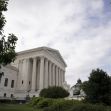The Supreme Court in April ruled to remove the Federal Trade Commission's (FTC) historic powers to recover criminal gains from companies and individuals breaking consumer laws. Since 1973, hefty fines paid by individuals or businesses who cheat or use deceptive marketing to consumers have been recovered by the Federal Trade Commission.
Due to this new decision, the FTC will no longer easily return funds to consumers ripped off by fraudulent or deceptive business practices.
The case evolved from a payday loan scam where the courts ruled in favor of the FTC. The defendants were ordered to pay the FTC $1.3 billion in relief. The defendants argued the FTC did not have the legal authority to seek monetary funds, and the case reached the Supreme Court, resulting in this new decision.
In a unanimous opinion led by Justice Stephen Breyer, the law giving the FTC the right to seek court injunctions for consumer fraud cases or marketing deception issues no longer includes the power to receive financial judgments.
The Supreme Court decision stated the FTC could no longer incur financial recoveries due to fraudulent or misleading consumer cases. Now, the FTC must rely upon other legal provisions, limited in scope, to try to obtain the funds in such cases.
The new ruling means the FTC must apply for financial recoveries via slower administrative proceedings, first identifying specific fraud or deceptive consumer business practices and then stopping the illegal conduct.
The four sitting members of the FTC disagreed with the new decision, and in court arguments, said the administrative system would not be effective and would be extremely slow. The FTC said in court that due to the new administrative protocol they must follow, the organization could only stop the illegal behavior but could no longer take the ill-gotten gains back from businesses that used fraud or deception at consumers' expense.
The Supreme Court acknowledged that the only option to request a change from the new decision would be in the hands of Congress.
In his written decision, Justice Breyer said, "If the commission believes that authority too cumbersome or otherwise inadequate, it is, of course, free to ask Congress to grant it further remedial authority."
The court ruling said Section 13(b) of the FTC Act does not authorize the commission to take monetary relief for violations of consumer laws. Court documents say Section 13(b) does not allow the FTC to obtain funds and can only "seek a permanent injunction" obtained via administrative proceedings.
"It is highly unlikely that Congress, without mentioning the matter, would grant the Commission authority to circumvent its traditional §5 administrative proceedings," Breyer said.
Due to the new Supreme Court ruling invoking Section 13, current investigations pending at the FTC or in Court will be impacted, resulting in a windfall for businesses and an absence of funds for the FTC.
Acting Chairwoman Rebecca Kelly Slaughter disagreed with the new decision and called for Congress to act. She said the FTC has provided billions of dollars in relief to defrauded consumers over the past forty years and had been particularly successful dealing with COVID-19 pandemic scams.
"In AMG Capital, the Supreme Court ruled in favor of scam artists and dishonest corporations, leaving average Americans to pay for illegal behavior," Slaughter said in a statement. "With this ruling, the Court has deprived the FTC of the strongest tool we had to help consumers when they need it most. We urge Congress to act swiftly to restore and strengthen the powers of the agency so we can make wronged consumers whole."
Over the past five years, the FTC told Congress last week, the commission used successful cases to reap $11.2 billion of "ill-gotten gains" and return the funds to consumers.
The Supreme Court’s opinion came in the case of AMG Capital Management LLC v. FTC.






